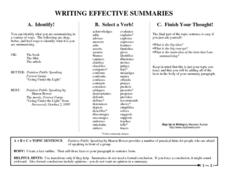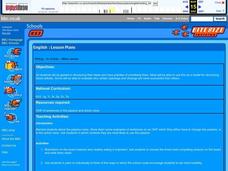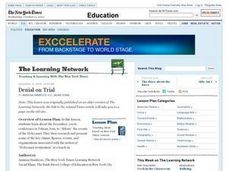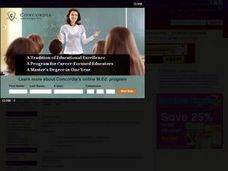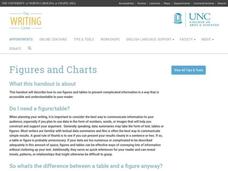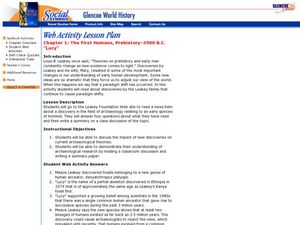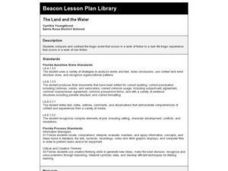Curated OER
Writing Summaries
Practice summary writing with informational texts. Young readers create summaries after reading magazine articles, newspaper articles, or other forms of informational texts. Readers use the GRASP strategy (read text, write what you...
Anchorage School District
Writing Effective Summaries
Drafting a strong first sentence for a summary is an important step. Writers can use the formula presented on this handout to get started. The resource lists three steps to put together a strong topic sentence, as well as tips and hints...
Curated OER
Writing An Article
Young writers compose an article on the benefits of healthy eating. They are coached on how to use the passive voice in their writing. On the whiteboard, they brainstorm ideas of why healthy eating is important, then use those ideas to...
Curated OER
Denial on Trial
What is the "Faurisson Affair”? What is “Holocaust Revisionism”? What does freedom of speech entail? Do revisionists have a right to voice their ideas? Such questions are at the heart of a richly detailed, thought provoking lesson...
The New York Times
Decision Point: Understanding the U.S.’s Dilemma Over North Korea
Simulate the Situation Room and analyze the US's relationship with North Korea. The plan starts off with a quick review and an examination of a online timeline that updates as the situation continues. Next, the class reads an article and...
Curated OER
Blogging to Create a Community of Writers #6: Writing a Review
Looking for a good social media lesson for your class? Then, this lesson is for you! They study various written reviews, then must choose an item to review of their choice. They can choose from: a book, restaurant, CD/musical...
Curated OER
Summarizing with Post It Notes
Students practice summarizing articles using post-it notes. They gather information for their own article and summarize it as well. They are assessed by their teachers and the quality of their notes.
Curated OER
Is TV Stronger Than Ever, or Becoming Obsolete?
The New York Times offers of two articles and two summaries for learners to consider. They read each article and then post a blog response to each of the seven related questions. The topic of the articles asks the question; Is TV...
Curated OER
Forms Of Knowledge
Learners put writing pieces into categories to show different organizational features in writing. In this writing lesson plan, students are shown examples of speeches, poems, editorials, cartoons, parodies, historical fiction, and more.
Curated OER
Mark Twain and Huckleberry Finn Introductory Lessons
“What is the role or function of controversial art? And, should children, our children, be required—forced—to study certain works they may find painful or humiliating or offensive?” Robert Zalisk’s question, found in his article, “Uproar...
Curated OER
Fact and Opinion Lesson Plan
How are fact and opinion different? Middle schoolers explore fact and opinion and write articles pertaining to a football match, eliminating all opinion statements in order to focus on the facts. Then they discuss bias in the media....
University of North Carolina
Psychology
Psychology, the scientific study of the human mind and behavior, is a popular major for many college students. An informative handout outlines common assignments in psychology courses. Scholars see how to design a research proposal,...
Curated OER
TEXT MESSAGING
Students examine the differences between standard and non-standard English and use text-speak to rewrite a plot summary and a news story. They identify a type of non-standard English and determine the characteristics that make it...
Curated OER
Cell-to-Cell
Ninth graders use online tutorials, class discussion, presentations and scientific articles to explore types of cells along with cell structure, function and behavior. They explore ethical questions related to cells and disease.
Curated OER
A Newspaper?
Sixth graders use newspapers to investigate fractions. They work in small groups to categorize articles, measure them with the grid transparency, and calculate the values represented. Afterward, they write a reflective essay on the role...
Curated OER
Writing Structure and Paragraph Lesson
Students review the correct form for writing paragraphs. In this paragraph writing activity, students rewrite a poorly written opening sentence. Students make changes to a closing paragraph. Students write a plan for an essay of five...
University of North Carolina
Figures and Charts
Sometimes words aren't the best way to get information across to the reader. The eighth handout in the 24-part Writing the Paper series describes different type of figures and charts to display complex information in a paper....
Curated OER
Here Ye! Here Ye! Read All About It!
Fourth graders explore the internet to find articles to read. In this reading comprehension lesson, 4th graders take notes on articles found on the internet. Students use the writing process to summarize the selected articles.
Curated OER
The Bear Facts About Summarization
Learners practice summarizing techniques in this lesson plan. They listen as the teacher reads from a non-fiction article, and the class creates a story map to highlight the most important facts from the article. They use the map to...
Curated OER
Publishing History
Students create an issue of a magazine. They work collaboratively to write articles for the magazine, design a cover and develop advertisements. Students complete their page layout, and create the magazine using information form each...
Curated OER
Charlie and the Chocolate Factory
Fourth graders research and write an author report on Roald Dahl, including books written by him, birthplace, family life, and other information on his writing. Students read aloud chapters in the book. Students create a newspaper...
Curated OER
The First Humans: Prehistory-3500 B.C. "Lucy"
Students explore prehistoric times by completing web activities in class. In this human ancestry lesson, students identify the archaeological discovery of the "Lucy" skeleton and what it meant for science. Students investigate the Leakey...
Curated OER
The Land and the Water
Third graders read "The Land and the Water," a fictional short story and an article about John F. Kennedy, Jr. and compare and contrast fictional tragedy to a non-fiction tragedy. They fill out a Venn diagram and write an essay using...
Curated OER
Feel the Music
Students identify and demonstrate a positive learning attitude. They also demonstrate responsible emotional and cognitive behaviors and identify how to communicate clearly in oral, artistic, written, and nonverbal form. Finally, students...



